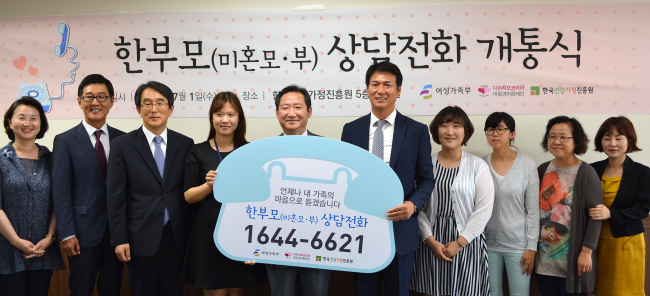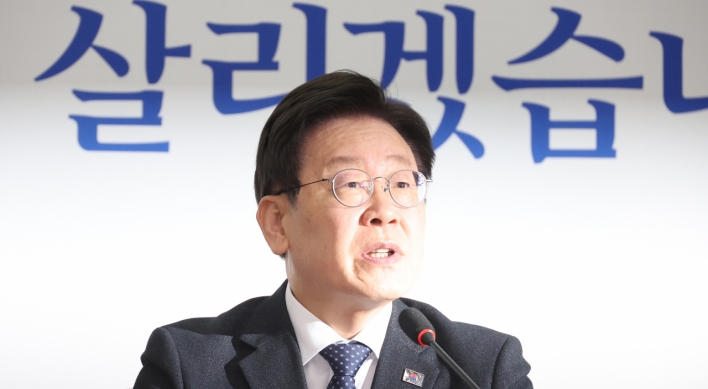When Yoon Ji-hee, a 43-year-old single mother, divorced in 2010, the court had ordered her ex-husband to pay her 800,000 won ($711) as child support for their two children every month.
But until March of this year, Yoon had never received anything from him. Diabetic and unemployed, she had been living in a tiny single room at a “goshiwon” -- cheap, dormitory housing mostly utilized by young students -- with her two teenage children.
Her eldest son, now 20, had been the sole breadwinner of the family, including for the monthly rent of 280,000 won.
“For Yoon, getting the overdue child support was the only way to help her son and ease his burden,” said Cho Young-jong, a debt collector who helped with her case at the state-run Child Support Agency.
Yoon is one of some 390,000 single parents in South Korea who had never received child support from the other parent. The latest government study showed that 83 percent of all single parents in Korea never received any payments in 2012. Of those, only 4.6 percent of them filed a lawsuit. And even among those who won their cases, 77.4 percent said they still did not receive any money, in spite of the court orders.
As of 2014, 77.3 percent of all Korean single parents were women.
But until March of this year, Yoon had never received anything from him. Diabetic and unemployed, she had been living in a tiny single room at a “goshiwon” -- cheap, dormitory housing mostly utilized by young students -- with her two teenage children.
Her eldest son, now 20, had been the sole breadwinner of the family, including for the monthly rent of 280,000 won.
“For Yoon, getting the overdue child support was the only way to help her son and ease his burden,” said Cho Young-jong, a debt collector who helped with her case at the state-run Child Support Agency.
Yoon is one of some 390,000 single parents in South Korea who had never received child support from the other parent. The latest government study showed that 83 percent of all single parents in Korea never received any payments in 2012. Of those, only 4.6 percent of them filed a lawsuit. And even among those who won their cases, 77.4 percent said they still did not receive any money, in spite of the court orders.
As of 2014, 77.3 percent of all Korean single parents were women.

To tackle the problem, the Gender Equality Ministry in March launched the Child Support Agency to support child-rearing single parents by enforcing child support payments. Since then, some 14,900 single parents contacted the agency for help, and 81 of them were able to receive their payments. The received payments totaled 226 million won as of last week.
“In some cases, the payments brought extra positive changes and mutual understanding. It also brought closure to ongoing conflicts,” said Bae So-young, a lawyer who works at the agency.
“One of the single mothers found out that her ex-husband had been refusing to pay the child support because he had been heartbroken about losing his right to see his children when they got divorced. So they made some compromises. He agreed to pay the child support, while his ex-wife agreed that he could gain his right to contact the children again.”
Bae also had a client, a single father, who claimed that his ex-wife purposely cut off all contact with him to avoid paying him child support. But when Bae contacted his ex-wife, she told a completely different story.
“The ex-wife told me that he had been stalking her all along, showing up at her work and her place. She said he had not been doing it necessarily because of the money, but because he had this unresolved grudge against her,” Bae said.
“She claimed that she had to cut contact because she was just so scared of him. So through us they made an agreement. She agreed to wire the money every month, while he agreed to never call or show up at her place again.”
Yoon, for her part, received 10 million won from her ex-husband with the help of debt collectors. With the money, she and her children were able to move into underground housing with two rooms and a living room. “Her daughter, who is in high school, is the happiest to get out of that goshiwon,” said the debt collector Cho.
Yet Kim Eun-hee, a Daegu-based activist for single parents’ rights, said back in March that laws should be further fortified to impose a criminal penalty for overdue child support payments.
The activist said she witnessed a number of unwed, single mothers being threatened by fathers of their babies. One mother, for instance, withdrew her case after her ex-boyfriend’s mother verbally attacked her for “ruining her son’s reputation,” and threatened to take custody of the child.
Lawyer Bae also acknowledged that it is harder for unwed mothers to claim their child support payments. In order for an unwed parent to seek child support, they have to legally prove to the court that the other parent and the child are in fact biologically related.
Once that has been done, they have to file a separate lawsuit to request for payments. The whole process can be as long as nine to 10 months, and costs about 5 million won if one proceeds with a private lawyer.
Meanwhile, the average monthly income of single-parent households was 1.72 million won, which is less than half the average of all households in the country at 3.53 million won, according to government data.
The biggest problem is that individuals can easily refuse to cooperate with the court’s request to take a DNA test under the current Korean law, said Bae. “The court currently does not have the authority to forcefully take their hair, blood or saliva samples for a DNA test,” explained Bae. “Doing so would be illegal and a violation of self-ownership.”
Jeong Ji-ah, another lawyer who works at the agency, said many unwed mothers don’t know where the other parent lives or works, and this also makes their situation difficult.
The state-run agency has access to the database of the National Health Insurance Service when tracking down the debtor’s place of employment. “It’s not that hard when the debtor works for a corporation,” said the lawyer.
“But when they are running their own businesses, or works for a private company, it’s very hard for us to track them down. Many times their address or contact information aren’t available anywhere.”
Lawyer Bae also explained that the current law also stipulates that a creditor of child support can request for personal information of the debtor at their place of employment. But it does not state that the debtor’s employer must comply with the request.
Because of such difficulties, only three unwed mothers have decided to proceed to prove their child’s biological link to their fathers with the agency. The agency offers the legal service for free.
“It’s not that many unwed mothers don’t want to do it,” said Bae. “Many times it’s literally impossible to reach the other parent. Law revisions can bring some positive changes to this.”
Korea’s lack of late child support payment penalties, as well as enforcement, have been also linked to the country’s high overseas adoption rates, as well as the low income of single-parent households.
About 90 percent of Korean adoptees are born to unwed, single mothers who have few resources to raise their children alone and are vulnerable to social stigmatization.
Bae said it is also necessary for single parents to work through their unresolved feelings against their ex-spouse.
Before joining agency, Bae worked with a female client who filed a suit against her ex-husband for overdue child support. The ex-husband, a medical doctor, moved from one hospital to another to avoid collectors and the court’s letters. “My client was a working pharmacist so that was one of the reasons. Her ex-husband didn’t think she needed his financial assistance,” Bae said.
“But another reason was that he still very much resented her, and on top of everything else, did not trust her. He didn’t think the money he gave would be spent on the children. Such cases are pretty common. It’s recommended to have closure to whatever issue a parent might have with the other parent before talking about child support.”
By Claire Lee (dyc@heraldcorp.com)







![[Hello India] Hyundai Motor vows to boost 'clean mobility' in India](http://res.heraldm.com/phpwas/restmb_idxmake.php?idx=644&simg=/content/image/2024/04/25/20240425050672_0.jpg&u=)









